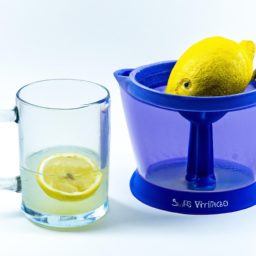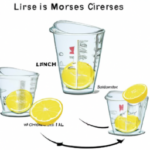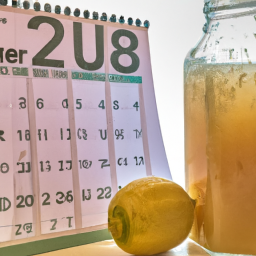As a cooking and baking enthusiast, I enjoy enhancing my dishes with a touch of acidity and flavor from lemons. It can be disappointing when you slice into a lemon and only get a small amount of juice. This made me curious about the quantity of juice one can extract from a lemon and the factors influencing the juice yield. To prevent frustration in the kitchen and maximize your use of lemons, continue reading for some unexpected tips and tricks!
In this article, I will explore the science behind lemon juice yield and share tips for getting the most juice out of your lemons. We’ll also discuss the various ways to use lemon juice in cooking and baking, and explore some common myths about lemon juice.
Whether you’re a seasoned chef or just starting out in the kitchen, understanding how much juice you can expect from a lemon can help you make the most of this versatile ingredient.
Key Takeaways
- The amount of juice from one lemon varies depending on the ripeness and size of the fruit, with ripe lemons yielding more juice due to thinner skin and softer texture.
- Using a citrus squeezer and mesh strainer can maximize juice extraction, and experimenting with the amount of pressure applied can also affect yield.
- Acidic varieties of lemons tend to yield more juice, and the juicing method used can also impact yield.
- To store lemon juice, it is recommended to keep it in an airtight container in the fridge with the date labeled, and it can also be frozen in ice cube trays for later use.
Factors that Affect Lemon Juice Yield
The amount of juice extracted from a lemon can be influenced by various factors, such as the ripeness of the fruit and the amount of pressure applied during squeezing.
When it comes to lemon juice extraction, the ripeness of the fruit plays a crucial role in the amount of juice yield. A ripe lemon tends to have more juice than an unripe one. This is because a ripe lemon has a thinner skin and is softer, making it easier to squeeze and extract juice.
Another factor that affects lemon juice yield is the amount of pressure applied during squeezing. Applying too much pressure can actually decrease the amount of juice yield since it can cause the bitter-tasting compounds in the lemon peel to mix with the juice. On the other hand, applying too little pressure can result in less juice yield. Therefore, it’s important to apply just the right amount of pressure to maximize the amount of juice extracted from the lemon.
With these factors in mind, let’s explore the average lemon juice yield.
Average Lemon Juice Yield
On average, you can squeeze about half an ounce of lemon juice from a single fruit, which may vary depending on its size and ripeness. However, there are several factors that can affect lemon juice extraction and measurement. Here are three examples:
-
Size: Bigger lemons tend to have more juice than smaller ones. Therefore, you may need multiple small lemons to yield the same amount of juice as one large lemon.
-
Ripeness: Ripe lemons are juicier than unripe ones. The skin of a ripe lemon is also thinner, making it easier to extract juice.
-
Juicing method: Different techniques for juicing lemons can affect how much juice you get. For example, using a citrus squeezer is more efficient than hand-squeezing, and microwaving the lemon for a few seconds before squeezing can help release more juice.
Knowing these factors can help you get the most out of your lemons. In the next section, I’ll share some tips for getting the most juice out of your lemons.
Tips for Getting the Most Juice
To maximize your lemony goodness, try using a lemon squeezer and squeezing your citrus over a mesh strainer placed over a bowl to catch any seeds or pulp. This will help ensure that you get the most juice out of your lemon and that it’s as pure as possible.
Additionally, try using acidic lemon varieties like Eureka or Lisbon lemons, which tend to have a higher juice yield than sweeter varieties like Meyer lemons.
When using lemon juice in cooking and baking, it’s important to keep in mind that the acidity of lemon juice can affect the outcome of your dish. Too much lemon juice can make a dish too tart, while too little can result in a lack of flavor.
Experiment with different amounts and taste as you go to find the perfect balance.
Using Lemon Juice in Cooking and Baking
When life gives you lemons, using their juice in cooking and baking can elevate the flavors of your dishes and desserts. Lemon juice is a versatile ingredient that can be used in cocktails, salad dressings, marinades, and sauces. Its acidity adds brightness and depth to any recipe, making it a popular ingredient in many kitchens.
In cocktails, lemon juice is often used to balance the sweetness of other ingredients and add a refreshing kick. It can also be used as a base for homemade lemonade or as a substitute for lime in drinks like margaritas.
When incorporating lemon juice into salad dressings, it can add a zesty tanginess that complements the flavors of the vegetables. Lemon juice can also be used to tenderize meat in marinades or to add a bright flavor to sauces like hollandaise. The possibilities are endless with this versatile ingredient.
When it comes to storing lemon juice, there are a few steps you can take to keep it fresh. One option is to freeze the juice in ice cube trays, which can then be easily added to recipes as needed. Another option is to store the juice in an airtight container in the fridge for up to a week.
With these storage tips in mind, you can always have a fresh supply of lemon juice on hand for all your culinary adventures.
Storing Lemon Juice
Make sure you keep your lemon juice fresh by following these simple steps for storing it. Storing lemon juice properly is important in preserving its freshness and flavor. Here are some tips on how to do it:
- Store freshly squeezed lemon juice in an airtight container. Glass jars or bottles with tight-fitting lids are ideal for this purpose.
- Refrigerate the container of lemon juice immediately after squeezing. This will slow down the oxidation process and prevent the juice from spoiling quickly.
- Label the container with the date the juice was squeezed. This will help you keep track of its freshness and ensure that you use it before it goes bad.
By following these steps, you can prolong the life of your lemon juice and ensure that it stays fresh for longer.
Now that you know how to store lemon juice properly, let’s explore some alternative citrus juices that you can use in your cooking and baking.
Alternative Citrus Juices
As I explore alternative citrus juices, I can’t overlook the tangy and acidic lime juice. It has a distinct flavor and aroma that are commonly used in various cuisines and drinks.
Another citrus juice worth considering is orange juice. It is a rich source of vitamin C and antioxidants.
Lastly, grapefruit juice is known for its bitter-sweet taste and potential health benefits. These benefits include weight loss and improved insulin resistance.
Lime Juice
You’ll be surprised at how much zing just a small squeeze of lime juice can add to your favorite dishes! Not only is lime juice a great addition to classic Mexican dishes like guacamole, but it can also be used to add acidity and brightness to seafood, salads, and even cocktails.
But did you know that lime juice also has some impressive benefits for your skin? Lime juice can help brighten and even out skin tone thanks to its high vitamin C content. It can also help reduce the appearance of dark spots and blemishes. This is because lime juice contains citric acid, which is known for its exfoliating properties.
Looking for a refreshing and healthy way to start your day? In the next section, we’ll explore the benefits of orange juice and how it can help boost your immune system.
Orange Juice
Get ready for a burst of vitamin C because we’re diving into the benefits of orange juice and how it can give your immune system a boost. Oranges are a great source of vitamin C, which is essential for a healthy immune system. Just one cup of orange juice contains about 124 mg of vitamin C, which is more than the recommended daily intake for adults. In addition to vitamin C, orange juice also contains other important nutrients such as potassium, folate, and thiamine.
To add even more health benefits, consider adding ginger to your orange juice. Ginger has anti-inflammatory properties and can help reduce nausea and improve digestion. Simply grate a small amount of ginger and mix it into your orange juice for a refreshing and healthy drink. And if you’re looking for a fun way to enjoy your orange juice, try mixing it into a cocktail. Some popular options include the Tequila Sunrise and the Screwdriver.
Speaking of cocktails, let’s move on to the next section and talk about grapefruit juice.
Grapefruit Juice
Let’s explore the tangy and refreshing world of grapefruit juice and discover its unique health benefits. As a citrus fruit, grapefruit has a high level of vitamin C, which is important for immune system health and collagen production.
Additionally, grapefruit contains antioxidants, such as lycopene and vitamin A, that can help reduce inflammation and protect against certain types of cancer.
When it comes to juice quality, grapefruit juice is best when it’s freshly squeezed. The nutritional value of the juice decreases over time, so it’s important to consume it as soon as possible after it’s made.
Adding sugar to grapefruit juice can also decrease its nutritional value, so it’s best to enjoy it without any added sweeteners.
With its unique tart flavor and impressive health benefits, grapefruit juice is a delicious and nutritious addition to any diet.
Speaking of citrus, let’s now move onto the topic of lemon zest.
Lemon Zest
If you’re feeling adventurous in the kitchen, adding a touch of lemon zest to your recipe can really spice things up and give it that extra kick!
Lemon zest is the yellow outer layer of the lemon peel, and it’s packed with flavor and nutrients. Not only does it add a bright, citrusy taste to dishes, but it also contains beneficial compounds like limonene and citral. These compounds have been shown to have anti-inflammatory and antioxidant properties, making lemon zest a great addition to a healthy diet.
Aside from its culinary uses, lemon zest is also a popular ingredient in natural health remedies. The essential oil derived from lemon zest is believed to have a range of benefits, including improving digestion, reducing stress, and boosting energy levels. Its antimicrobial properties also make it a popular choice for cleaning and disinfecting surfaces.
With all these benefits, it’s no wonder that lemon zest is a staple in many kitchens and natural health routines. Speaking of health benefits, let’s explore the benefits of lemon juice in the next section.
Lemon Juice Health Benefits
Lemon juice’s health benefits go beyond just adding flavor to your dishes. In fact, it contains a high level of antioxidants that can help protect your body from harmful free radicals. These antioxidants are known to reduce the risk of chronic diseases such as cancer and heart disease.
Additionally, lemon juice is a great source of vitamin C, which is essential for a healthy immune system. Furthermore, lemon juice can also benefit your skin health. The vitamin C found in lemon juice can help boost collagen production, which is essential for skin elasticity and reducing the appearance of fine lines and wrinkles.
Additionally, lemon juice has natural astringent properties that can help tighten pores and reduce excess oil on the skin’s surface. So, not only is lemon juice a delicious addition to your meals, but it also has numerous health benefits for your body and skin.
As we’ve learned about the health benefits of lemon juice, let’s now dive into some common myths about this citrus fruit and its juice.
Lemon Juice Myths
I’ve always heard that lemon juice can help with weight loss, detoxification, and acidity. But, are these claims actually true? Let’s dive into the science behind these myths.
First, let’s explore whether lemon juice can really help with shedding those extra pounds.
Next, we’ll discuss its supposed detoxifying properties and whether they hold any merit.
Finally, we’ll examine whether drinking lemon juice actually makes our bodies more acidic or if that’s just a common misconception.
Lemon Juice and Weight Loss
You can easily incorporate lemon juice into your weight loss journey by adding it to your water or using it as a salad dressing. Lemon juice contains citric acid, which has been found to boost metabolism. When consumed regularly, it can help increase the rate at which your body burns fat.
Additionally, lemon juice can aid in digestion by stimulating the production of bile, which helps break down food in the stomach. It’s important to note, however, that lemon juice alone cannot guarantee weight loss. It should be used in conjunction with a healthy diet and exercise routine.
Furthermore, excessive consumption of lemon juice can lead to tooth enamel erosion and acid reflux. As with any dietary changes, it’s important to consult with a healthcare professional before making any significant changes to your diet. With that being said, incorporating moderate amounts of lemon juice into your diet can be a beneficial addition to your weight loss journey.
Moving on to the next section about lemon juice and detox, it’s important to understand the potential benefits and limitations of using lemon juice as a detox agent.
Lemon Juice and Detox
I’ve always known that lemon juice isn’t only a great source of vitamin C, but it also has several health benefits. In the previous subtopic, we talked about how lemon juice can aid in weight loss.
Now, let’s dive into another benefit of lemon juice – detoxification.
Lemon water benefits our bodies in many ways, and one of them is by helping us cleanse our system. Lemon juice contains citric acid, which stimulates the liver to produce more bile, aiding in digestion. Moreover, it also acts as a natural diuretic, flushing out toxins from the body.
Drinking lemon water regularly can help with bloating, constipation, and other digestive issues. The lemon juice cleanse is a popular detox method that involves drinking lemon water for a few days to eliminate toxins from the body and promote overall health.
Incorporating lemon juice into your daily routine can have lasting benefits for your health.
Moving on to the next subtopic, let’s explore how lemon juice affects acidity in our body.
Lemon Juice and Acidity
Lemon juice can affect the acidity levels in our body, with a pH of 2-3, making it highly acidic. This acidity can have an impact on our skin and hair.
When applied topically, lemon juice can act as a natural astringent and help to tighten and brighten skin. However, it’s important to note that lemon juice can also cause skin irritation and sensitivity, especially for those with sensitive skin. It’s always recommended to dilute lemon juice with water before applying it to your skin.
In terms of hair, lemon juice can be used as a natural clarifying agent to remove buildup and excess oil. It can also lighten hair when exposed to sunlight. However, it’s important to be cautious when using lemon juice on your hair, as the high acidity can cause damage and dryness if overused. It’s best to mix lemon juice with a carrier oil or conditioner before applying it to your hair, and to limit its use to once a week or less.
Overall, while lemon juice can have benefits for our skin and hair, it’s important to use it in moderation and with caution.
Frequently Asked Questions
How many lemons does it take to make a cup of lemon juice?
I typically use about 5-6 lemons to make one cup of lemon juice. However, there are lemon juice substitutes available if you don’t have enough lemons. Lemon juice is a versatile ingredient and can be used in various recipes.
Can I use bottled lemon juice instead of fresh lemon juice in recipes?
Oh sure, you can definitely use bottled lemon juice instead of fresh lemon juice. But why settle for something that’s been sitting on a shelf for who knows how long when you can enjoy the benefits of using fresh lemon juice? It’s packed with Vitamin C, antioxidants, and has a bright, zesty flavor that can’t be beat. Plus, you never know what kind of preservatives or additives are lurking in that bottled stuff. Trust me, your taste buds (and your health) will thank you for squeezing your own lemons.
Is it better to hand-squeeze lemons or use a juicer?
Based on my experience, using a juicer yields higher quality lemon juice than hand squeezing. The juicer extracts more juice and avoids the bitter taste from the peel. However, the amount of juice per lemon may vary.
Can I freeze fresh lemon juice for later use?
Yes, fresh lemon juice can be frozen for later use. To preserve its quality, consider freezing in ice cube trays or airtight containers. Thaw in the fridge or at room temperature. Avoid refreezing.
How long does freshly squeezed lemon juice last in the fridge?
Wow, freshly squeezed lemon juice is like liquid gold! It lasts up to 2 weeks in the fridge, but adding a dash of citric acid can extend its shelf life. Properly storing lemon juice in an airtight container is key to preventing expiration.
Conclusion
In conclusion, the amount of juice that you can get from one lemon can vary depending on several factors such as the size, ripeness, and juiciness of the fruit. On average, a standard-sized lemon can yield around 2-3 tablespoons of juice. However, you can maximize the amount of juice you can get from each lemon with the right techniques and tools. For instance, rolling the lemon on the countertop before cutting it helps break down the membranes, making it easier to extract more juice. Additionally, using a citrus juicer or reamer can significantly increase the juice yield from one lemon, ensuring you get the most out of every squeeze. By combining these methods, you can make the most of each lemon, regardless of its natural variability.
Whether you’re using lemon juice for cooking, baking, or for its health benefits, it’s important to know how to properly store it to maintain its freshness and flavor. Additionally, if you’re looking for alternative citrus juices, you can try using lime, grapefruit, or even orange juice.
Regardless of how you choose to use it, lemon juice is a versatile ingredient that can add a burst of flavor and nutrition to any dish.
Cindy thoroughly researches juicing trends, techniques, and recipes to provide readers with practical advice and inspiration. Her writing style is accessible, engaging, and designed to make complex concepts easy to understand. Cindy’s dedication to promoting the advantages of juicing shines through her work, empowering readers to make positive changes in their lives through the simple act of juicing.

















